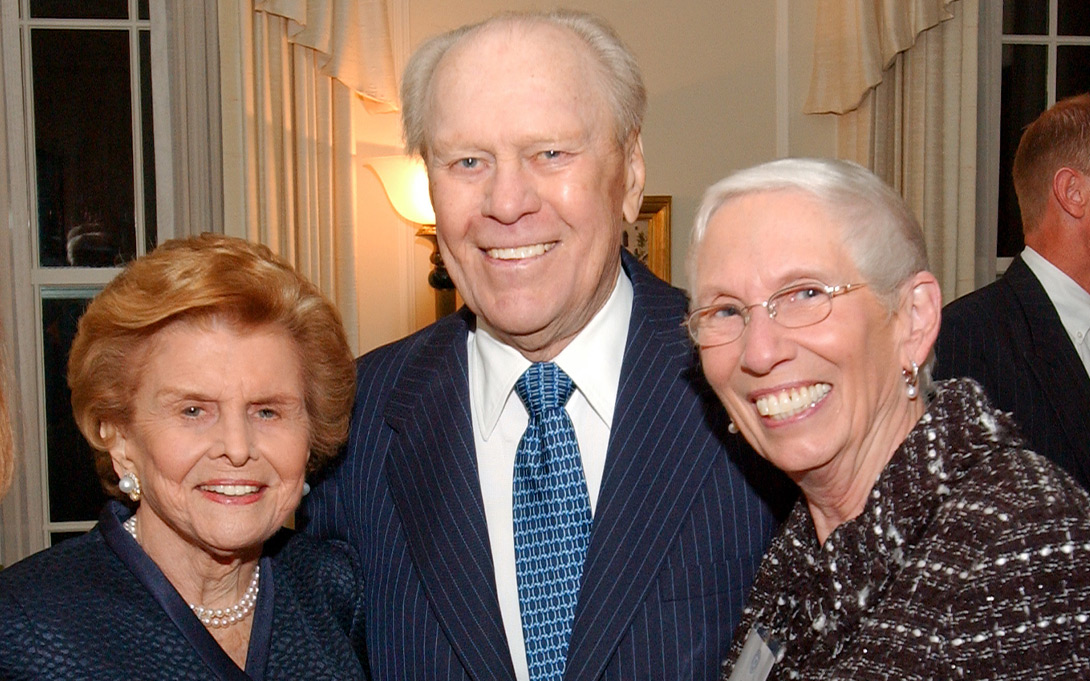
Margaret Ann (Ranny) Riecker (HLLD '05) is the Ford School's single most generous supporter of students. Her philanthropy through the Herbert H. and Grace A. Dow Foundation (where she is president), the Harry A. and Margaret D. Towsley Foundation (where she is chair), and her personal giving with her late husband, John Riecker (AB '52, JD '54) has already funded the education of 16 public policy students, and more than 400 students campus-wide.
Here at the Ford School, Riecker and her family have also:
- helped support the construction of Joan and Sanford Weill Hall, leading to the naming of the Margaret Dow Towsley Reading Room in honor of Ranny's late mother;
- endowed the Towsley Foundation Policymaker-in-Residence program; and
- significantly advanced the Science, Technology and Public Policy program through funding for postdoctoral students.
She also chaired the School's highly-successful fundraising campaign and serves on its advisory committee.
A former Republican National Committee member, Ranny Riecker is a frank advocate for a Michigan characterized by a diverse economic base, effective health care, informed policy, civility in public life, and respect for the value of education. She recently shared her thoughts about current events and her reasons for supporting the Ford School.
State & Hill: Let's start with some big questions: What do you think about the state of our world? What are the issues that keep you up at night?
Ranny Riecker: The economy keeps me up late. I think President Obama is extremely charismatic and quite successful at promoting his policies. But I also think his proposals leave open some important questions. I'm an advocate for electronic medical records, for example. But we haven't even started to assess the cost of digitizing everything. Just our health care system here in Midland alone would have to pay close to $30 million to make it happen. How can we achieve this goal in a way that we can afford?
S&H: In the face of these economic challenges, what tools does Michigan have to turn things around?
RR: Our higher education system is one of our greatest assets. It's very hard for people in Michigan to stop thinking about everything in relation to automobiles. But the U-M and our other research universities around the state have so much talent that they can devote to incubating new industries like alternative energy and health sciences.
S&H: Where is the Ford School's role in this process?
RR: I'll be honest again: Michigan's legislators and governor don't understand the assets they have here. There are so many times when they wouldn't need to hire outside experts because they could go to U-M or any of our other universities for more and better advice. Of course the School is doing some very interesting things with local communities—with the bridge in Detroit, for example. It's not an ivory tower. But it can be very hard to get people to change the way they look at universities.
S&H: You and your late husband, John, have been the School's largest supporters of students. What inspired you to give for student aid?
RR: The thing that really frightens me is that we're balancing our state budget on the backs of the future by cutting education. For example, much of my support now is for science policy because we don't raise scientists anymore. If we're going to have a foreign policy that allows people into the U.S. on education visas and then forces them to get a green card or go home, we're going to have to start cultivating our own talent.
S&H: If we were to look back 50 or 100 years from now, what would you want to see as your legacy?
RR: Positive change in the quality of life for citizens in the communities we've touched. And some civility in our public policy, in our dealings with people we disagree with...or even those we agree with.
S&H: What are the things that make you happy or proud or excited to live in Michigan?
RR: I love this state: the variety, the lakes...And the people. Even with all our problems, there are so many positive people. Michigan has historically been a breeding ground for entrepreneurs, people who make positive improvements. We love our history, but we don't rest on our laurels.
Below is a formatted version of this article from State & Hill, the magazine of the Ford School. View the entire Fall 2009 State & Hill here.